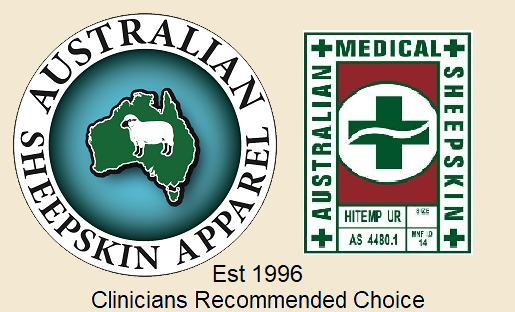Veterinary Use
Posted by Stephen Playford on
Animal Wound Care
May 2, 2005
This colt was born to be a registered cutting horse. It had been kicked and bitten by a gelding since birth resulting in the wounds as shown.

Note: The shear cliff face edges of the wounds and the tunnelling that is occurring. Drains had been inserted into the wounds to extricate moisture from the wounds (these are wounds in progression not regression).
Treatment: Use Australian medical sheepskin (AMS) as a dressing changed every day and held in place by a half pair of pyjama pants. Each (AMS) dressing is machine washed in Skinsan detergent and tumble dried each day.
The colt was to be kept away from any further harm and as high a protein diet as possible.If (AMS) fibre sticks to the wound simply flood with Saline or water until (AMS) falls away. Note: Mechanical debriding is not required with (AMS) as necrotic tissue will simply self slough when enough granulated tissue has formed underneath.
May 12, 2005
Note the rolling of the edges of the wounds and the lack of tunnelling. The wounds had decreased so much in size that the drains would no longer fit. Drains were removed at this point as the (AMS) continued to control excess moisture and allowing granulated tissue to form with great ease. This had occurred in only ten days.

May 16, 2005
Note: The use of the pyjama pants to hold dressing in place and the amount of granulation formed in the wounds with massive reduction in size of the wounds. The wound on the rear of the elbow now has the tendant and fully granulated over.


May 21, 2005
This photo was taken 5 days later to show the amount of rolling of tissue on the elbow, this was the hardest area to treat as it is always in motion, however, look at the progress.

May 23, 2005
At 21 days the two smaller wounds had formed necrotic tissue, this tissue was not debrided at our instruction and simply sloughed off in approx 4 days leaving no scaring.

June 6, 2005
At 4 weeks and 4 days, the 2 smaller wounds had completely healed with reformation of hair, with the other 2 wounds almost a memory.

September 6, 2005
All wounds have completely healed leaving absolutely no scaring. Before the intervention of (AMS) from Australian Sheepskin Apparel, this colt was going to be put down. However not only did this colt survive and was able to be registered as a cutting horse, but all the wound healing shown was achieved in the most highly infectious environment possible, a barn yard. Think what you can do in home or in a facility.

Photos courtesy of Rocky Mountain House.
Share this post
- 0 comment
- Tags: Granulation, Protein, Veterinary








